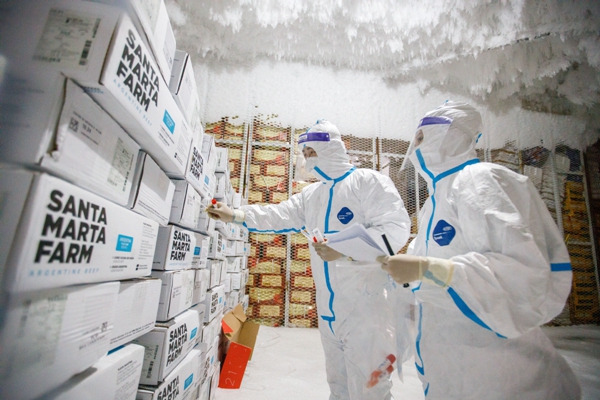Cold-chain goods major cause of infections
 0 Comment(s)
0 Comment(s) Print
Print E-mail China Daily, February 3, 2021
E-mail China Daily, February 3, 2021

Studies into the clusters of COVID-19 cases in recent months show that contaminated cold-chain food products are the major cause of the outbreaks, highlighting the need for protection of workers associated with the industry, experts said.
"Research has indicated that the novel coronavirus can survive on cold-chain food and food packaging during long distance shipping and may cause human infection, in particular to high-risk people such as dockworkers," said Liu Zhaoping, a researcher at the China National Center for Food Safety Risk Assessment.
"However, the likelihood of food-to-human transmission is considered lower than with other routes of transmission."
Investigations into the source of the outbreaks in cities across China, including Beijing and the port cities of Dalian, Liaoning province, and Qingdao, Shandong province, found many of them could be traced to workers at cold storage areas, seafood processing plants and markets selling imported frozen food products, he said.
In many areas, the RNA of the novel coronavirus has been detected on the surface of frozen food, including salmon, shrimp, beef and chicken, as well as their packaging. Most of them were imported from countries where the pandemic is still wreaking havoc, Liu said.
Meat and poultry processing facilities are more prone to outbreaks due to the cold and humid environment, where it's easier for workers to catch and transmit respiratory diseases. Food products and their packaging are likely to be contaminated by droplets exhaled from virus carriers through actions such as breathing, coughing and talking.
Studies have shown that the novel coronavirus remains highly stable under freezing conditions, so it may survive cold-chain transportation.
Christopher Elliott, a professor of food safety at Queen's University in the United Kingdom, said: "There was a growing knowledge to suggest that the novel coronavirus could have a longer survival time at lower temperatures."
COVID-19 outbreaks in port cities such as Dalian and Tianjin were caused by harbor workers, who were infected after coming into contact with frozen food and packaging, he said.
"The isolation of a live virus in the Qingdao case study has further confirmed the transmissibility from food packaging to humans," he said.
The investigation into the COVID-19 outbreak in Qingdao for the first time isolated live samples of novel coronavirus taken from imported frozen seafood packaging, proving the possibility of virus transmission via frozen food, according to a study published by the Chinese Center for Disease Control and Prevention in October.
The possibility of the virus being transmitted via frozen food was first raised after a COVID-19 outbreak at a wholesale market in Beijing in June. Cutting boards used to handle imported salmon in the market tested positive for the virus.
Before the outbreak, Beijing had reported no new domestically transmitted cases for about two months, and the virus was effectively under control in the rest of the country.
A research paper jointly published in October by Tsinghua University, the Beijing Center for Disease Control and Prevention and the Chinese Academy of Medical Sciences and other institutes said the outbreak was highly likely to have been caused by imported contaminated frozen food.
During an outbreak in Dalian between Dec 15 and Jan 11, which involved 51 confirmed COVID-19 patients and 32 asymptomatic carriers, epidemiologists identified imported frozen food as the origin of the outbreak.
Five stevedores were infected in early December while unloading frozen food from a foreign cargo ship. They later spread the disease via human-to-human transmission, according to the Dalian government.
Recent studies have also found that transportation containers may also harbor live coronavirus in low winter temperatures.
In November, health authorities in Shanghai said two workers who did not wear masks became infected while cleaning a sealed container flown in from North America.
All of China's major infection clusters since December were caused by inbound travelers or contaminated cold-chain goods, Ma Xiaowei, the health minister, said last month.
Intensified supervision
China has intensified supervision of imported frozen food since the June outbreak in Beijing, to cover the cold-food chain industry across the country. Strict epidemic prevention and control measures have been applied to the sector, and front-line port workers have been included on the priority list of occupations for COVID-19 vaccinations.
Liu, from the center for food safety, said as COVID-19 continues to spread across the world, relevant departments should strengthen the inspection of inbound cold-chain goods, especially from countries or regions with serious outbreaks.
Meanwhile, measures to protect cold-chain workers should be increased to minimize the risk of infection, he said. "Keeping all workers in the food supply chain healthy and safe is vital for their personal wellbeing, for their families, and for ensuring that consumers' needs are met."






Go to Forum >>0 Comment(s)